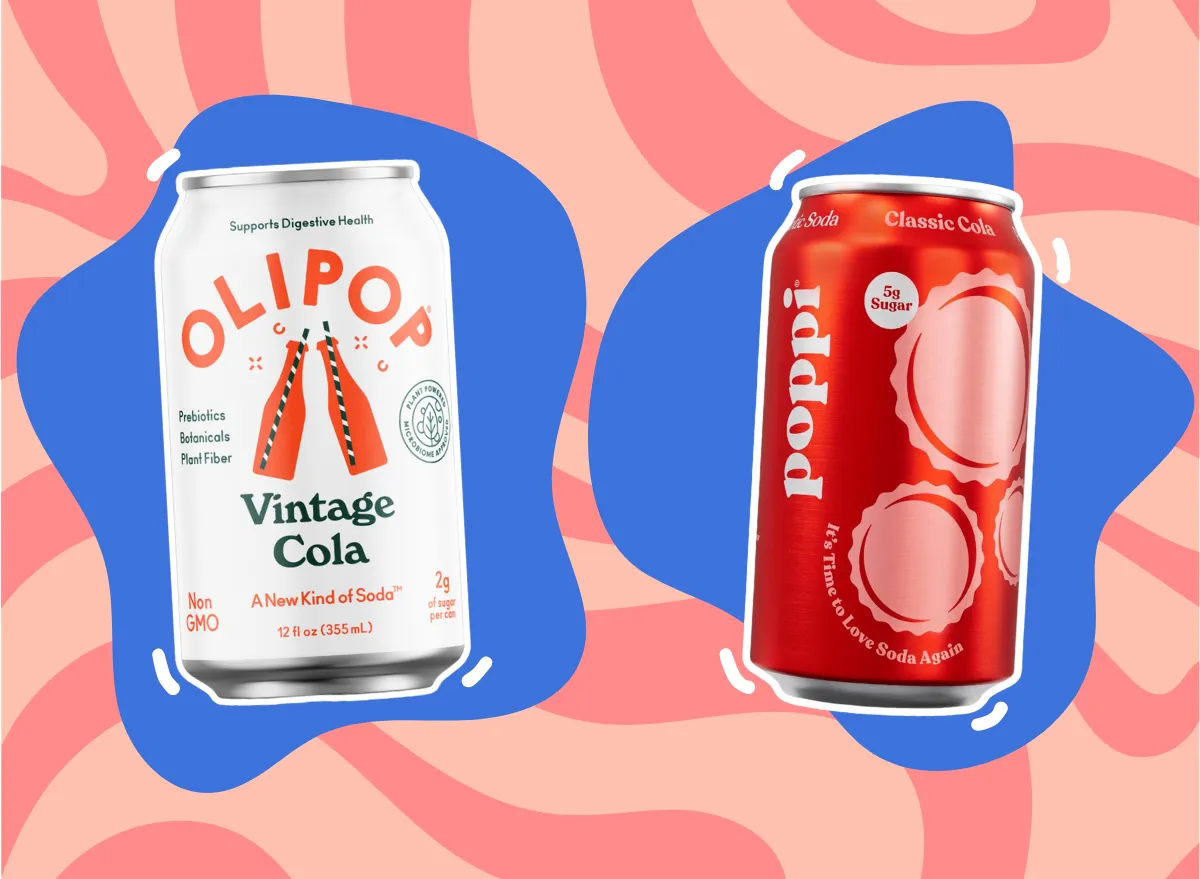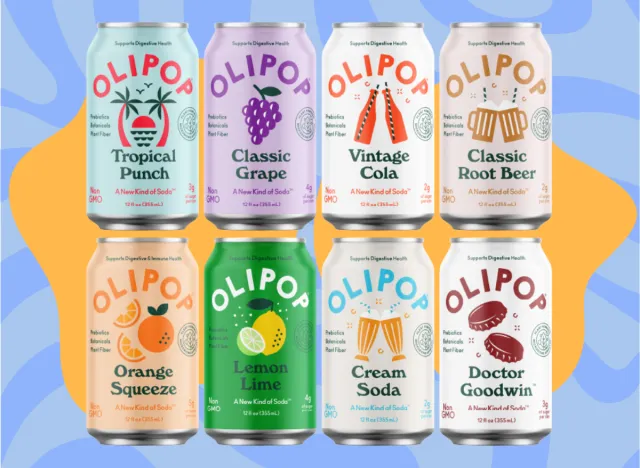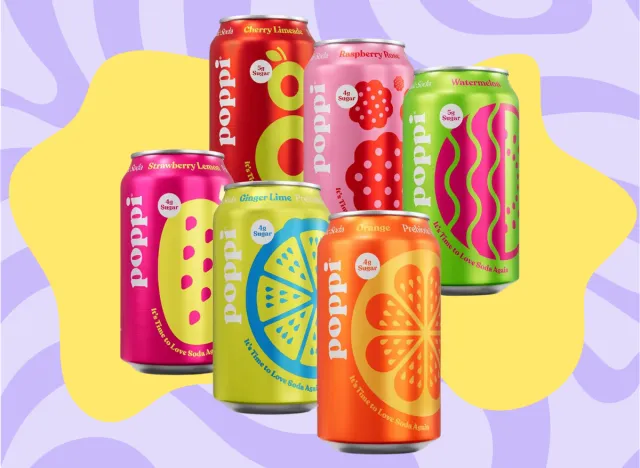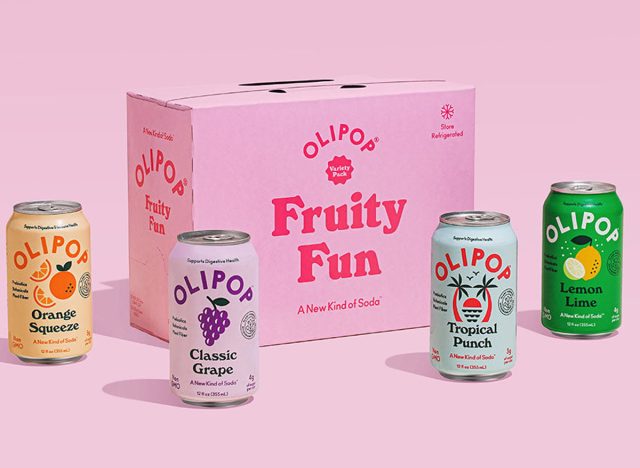OLIPOP vs. Poppi: A Dietitian Reviews Both Prebiotic Sodas

At first glance, OLIPOP and Poppi might be easy to mix up, which makes sense because these healthy sodas share a lot of similarities. Both brands are leading the charge in the new and growing category of prebiotic sodas, which claim to be healthier alternatives to traditional sugary drinks. They each have "pop" in their name and a similar flavor lineup.
But with their similar packaging and nutritional propositions, it's easy to get confused about what sets these two sodas apart. And since prebiotic sodas are still new to many people, knowing which one to choose can be tricky.
We wanted to look at these two popular brands more closely to see what makes each unique, how they stack up when it comes to nutrition and health benefits, and how they may fit into a balanced eating plan. So, let's dive into the differences between OLIPOP vs. Poppi.
What are Prebiotic Sodas?
As gut health continues to be a hot topic, functional beverages are gaining popularity for their potential health benefits. Prebiotic sodas are one of the latest additions to this trend, aiming to offer a healthier alternative to sugary sodas—a significant source of added sugar in the American diet. In fact, two out of three American adults drink a sugar-sweetened beverage daily, contributing to increased risks of weight gain, type 2 diabetes, and heart disease.
Prebiotic sodas are carbonated drinks that contain added nutrients to support your gut health. These nutrients, known as prebiotics, are specific types of non-digestible fibers like fructo-oligosaccharides (FOS), galacto-oligosaccharides (GOS), inulin, and lactulose, which serve as food for the beneficial bacteria in your gut. Unlike other types of fiber, which can be rough and insoluble, prebiotic fibers are water-soluble, which allows them to dissolve easily when extracted from food and then added to beverages.
It's easy to confuse prebiotics with probiotics, but they serve different purposes. Probiotics are the friendly bacteria that live in your gut that help support digestion, make vitamins, and bolster your immune system. Prebiotics, on the other hand, are a source of food for probiotics, helping to maintain a healthy balance of microorganisms that can influence your overall health.
Natural sources of prebiotics include onions, peas, bananas, and barley. Prebiotic sodas like OLIPOP and Poppi use isolated prebiotic fiber extracts from foods like agave and chicory root.
Overview of OLIPOP

OLIPOP is branded as "A new kind of soda" with prebiotics, botanical extracts, and plant fiber.
What is OLIPOP?
According to the official OLIPOP website, Ben Goodwin and David Lester developed their prebiotic with a goal of creating a tasty and wholesome tonic that could replace sugary soda for a healthier future.
The prebiotic soda comes in 17 flavors, including familiar options like Vintage Cola, Cream Soda, and Root Beer, as well as some fruity flavors like Banana Cream, Tropical Punch, and Watermelon Lime.
Ridge Rush is one of the newest flavors from OLIPOP and is a citrus drink with 50 milligrams of green tea caffeine. Vintage Cola, Cherry Cola, and Doctor Goodwin also have green tea caffeine.
Nutritional Profile
Calories: 35-50
Fat: 0 g (Saturated Fat: 0 g)
Sodium: 20-35 mg
Carbs: 16 g (Fiber: 9 g, Sugar: 2-5 g)
Protein: 0 g
Key Ingredients
The key ingredient in OLIPOP is OLISmart, a proprietary blend of prebiotic fibers and botanicals consisting of cassava fiber, chicory root inulin, Jerusalem artichoke inulin, nopal cactus extract, marshmallow root extract, calendula flower extract, and kudzu root extract.
For sweetness, OLIPOP uses cassava root syrup, apple juice concentrate, and stevia. Each individual flavor has other ingredients like natural ginger flavor in the ginger lemon soda and tart cherry juice concentrate, natural white cherry flavor, and natural vanilla flavor in the cherry vanilla.
Benefits of OLIPOP
Can a soda offer benefits? OLIPOP just might.
Low in Calories and Sugar
As a soda replacement, OLIPOP is a clear winner. It's low in calories and added sugar, with 5 grams or less per can—meeting just 10% or less of the daily value. In contrast, a 12-ounce can of cola has about 150 calories and 37 grams of added sugar, meeting about 75% of the daily value.
Natural Sweeteners, Not Artificial Ones
Instead of artificial sweeteners, OLIPOP uses stevia, a natural, no-calorie sweetener derived from the Stevia rebaudiana plant that grows in South America. The prebiotic soda isn't too sweet and doesn't have a strong off-putting stevia aftertaste.
High Fiber Content
One of OLIPOP's key benefits is its fiber content. Each 12-ounce can contains 9 grams of fiber—32% of your daily needs. With 95% of Americans not meeting their daily fiber intake, OLIPOP can help fill the gap, offering benefits of fiber like improved digestion, weight management, and lowered cholesterol.
Commitment to Ongoing Scientific Research
By participating in scientific studies and holding itself to high industry standards, OLIPOP demonstrates a commitment to supporting its health claims with research, not just marketing. The brand's benefits are primarily attributed to its prebiotics and botanicals, and OLIPOP has taken steps to verify these benefits through scientific research.
Researchers from Purdue University conducted a test-tube study to better understand how OLIPOP affects gut health. Though not yet peer-reviewed, the study found that the fibers in OLIPOP stimulated the growth of Bifidobacteria, a beneficial probiotic. Additionally, the botanicals appeared to enhance fermentation and increase the production of short-chain fatty acids (SCFAs), important metabolites that may influence gut-brain communication. While these results are promising, they don't directly confirm that OLIPOP's ingredients have the same effects on human gut health.
OLIPOP is also part of a long-term clinical study led by Dr. Jens Walter at University College Cork in Ireland, which will explore the effects of prebiotic and fiber consumption in the Western diet and further validate OLIPOP's health benefits in a real-world setting.
Lastly, OLIPOP earned a NutriStrong™ certification—the first beverage to achieve this recognition. The industry-wide program classifies products based on rigorous standards, and OLIPOP received this certification due to the quantity and potency of its prebiotics, routine testing, and adherence to good manufacturing practices.
Overview of Poppi

Poppi is on a mission to serve as a healthier alternative to sugar-sweetened beverages. It's a carbonated drink that's low in calories and sugar and a source of prebiotic fiber and apple cider vinegar.
What is Poppi?
Poppi, a Texas-based beverage company founded by Allison and Stephen Ellsworth, started as a farmer's market product and grew into a grocery store brand after a 2019 Shark Tank investment.
Initially, Poppi contained fruit juice and apple cider vinegar (ACV). The brand claimed that ACV had prebiotic benefits; however, these claims were based on in-vitro studies of pectin found in apple skin, not apple cider vinegar. Experts interviewed by The Washington Post noted that there isn't enough scientific support for prebiotic benefits from ACV alone. In 2023, Poppi reformulated its soda to include 2 grams of prebiotic fiber sourced from agave inulin to provide more direct prebiotic benefits.
In 2024, Poppi faced a lawsuit alleging insufficient prebiotic content for gut health, which the brand strongly disputes.
The fizzy prebiotic soda comes in 15 flavors, including classic cola and root beer, along with fun flavor combinations like strawberry lemon, orange cream, and raspberry rose.
Nutritional Profile
Calories: 20-25
Fat: 0 g (Saturated Fat: 0 g)
Sodium: 0 mg
Carbs: 6-7 g (Fiber: 2 g, Sugar: 4-5 g)
Protein: 0 g
Key Ingredients
Poppi's prebiotic soda is made with fruit juice, apple cider vinegar, and inulin. Organic cane sugar is one of the first ingredients listed, and the drink also uses stevia to add sweetness.
Benefits of Poppi
Poppi also makes a good alternative to sugary soda and fruit juice. It's low in calories and added sugar and has no sodium.
Contains Apple Cider Vinegar
Apple cider vinegar is one of the main ingredients in Poppi. ACV is promoted to offer numerous health benefits, such as lowering blood sugar, controlling appetite, and improving athletic performance. While apple cider vinegar adds flavor and is safe to consume, there's very little evidence that it provides any purported health benefits.
Following the lawsuit, Poppi no longer makes ACV-related health claims. However, they say the sweet and tart vinegar improves flavor.
Small Amount of Fiber
Agave inulin is the prebiotic in Poppi, providing the 2 grams of fiber in each 12-ounce can, meeting 7% of your daily fiber needs.
The added inulin in the soda may support gut health by improving bacterial balance in the gut, but you may need to drink more than one ca a day to get the benefits. A small clinical study published in 2015 in the Journal of Nutrition found that supplementing with 5 to 7.5 grams of agave inulin for 21 days made a positive shift in the gut microbiome. But larger studies are needed to confirm the potential health benefits of the prebiotic.
Main Differences Between OLIPOP vs. Poppi
The nutrition profile and ingredients are the key distinctions between OLIPOP and Poppi prebiotic sodas.
OLIPOP is slightly higher in calories but contains more fiber and prebiotics, with ingredients like two types of inulin (chicory root and Jerusalem artichoke) and resistant starch from cassava root fiber, along with additional botanical extracts.
Poppi is lower in calories and has more added sugar than OLIPOP. It has fewer overall ingredients due to the lack of botanical extracts found in OLIPOP.
OLIPOP vs. Poppi: Does One Taste Better?
I tried both prebiotic sodas and found the flavor pleasant. I dislike the stevia aftertaste in most products, but neither drink had a strong aftertaste. I was worried about gas and bloating, especially from the OLIPOP drink with its 9 grams of fiber, but didn't experience any stomach problems.
Dietitian's Verdict: Is One Healthier?

Nutritionally, OLIPOP may make a better choice vs. Poppi.
Though higher in calories, OLIPOP offers significantly more fiber (32% DV vs. Poppi's 7%). It also has less added sugar, on average, than Poppi, and it uses apple juice concentrate and cassava root syrup as sweeteners rather than cane sugar.
Final Thoughts
Either drink makes a significantly better choice than soda (regular or diet). Both prebiotic sodas are much lower in sugar, have no artificial ingredients, and can help you get closer to your daily fiber needs.
Prebiotic sodas are a good option for boosting fiber intake, but they can't fully replace whole-food sources like peas, beans, and bananas, which provide other health-promoting nutrients. But if you're one of the 66% of people who drink soda daily, switching over to a low-sugar prebiotic soda could be a healthier choice.
However, if your diet is low in fiber, be cautious: adding too much fiber too quickly can lead to gas, bloating, and constipation, so it's best to increase fiber intake gradually.
- Source: https://www.sciencedirect.com/topics/agricultural-and-biological-sciences/functional-beverage
- Source: https://www.ncbi.nlm.nih.gov/pmc/articles/PMC6463098/
- Source: https://www.worldgastroenterology.org/guidelines/probiotics-and-prebiotics/probiotics-and-prebiotics-english
- Source: https://www.fda.gov/regulatory-information/search-fda-guidance-documents/small-entity-compliance-guide-statement-identity-nutrition-labeling-and-ingredient-labeling-dietary
- Source: https://fdc.nal.usda.gov/fdc-app.html#/food-details/2346111/nutrients
- Source: https://www.ncbi.nlm.nih.gov/pmc/articles/PMC8600158/
- Source: https://www.ncbi.nlm.nih.gov/pmc/articles/PMC6124841/
- Source: https://www.biorxiv.org/content/10.1101/2023.04.17.537114v2
- Source: https://www.ncbi.nlm.nih.gov/pmc/articles/PMC4908950/
- Source: https://www.frontiersin.org/journals/endocrinology/articles/10.3389/fendo.2020.00025/full
- Source: https://www.foodnavigator-usa.com/Article/2020/11/03/The-rise-and-rise-of-OLIPOP-Our-repurchase-rates-are-astronomical#
- Source: https://www.ucc.ie/en/inspire/supervisors/jenswalter/
- Source: https://www.nutrasource.ca/certifications-by-nutrasource/nutrastrong/
- Source: https://doi.org/10.15406/jnhfe.2014.01.00018
- Source: https://medlineplus.gov/druginfo/natural/816.html
- Source: https://doi.org/10.3945/jn.115.217331









